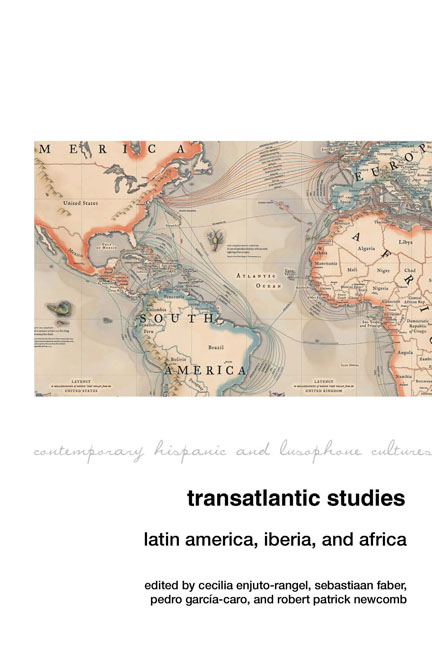Book contents
- Frontmatter
- Contents
- Introduction: Transatlantic Studies: Staking Out the Field
- Transatlantic Methodologies
- Transatlantic Linguistic Debates
- Transatlantic Displacement
- Transatlantic Memory
- Transatlantic Postcolonial Affinities
- Transatlantic Influence
- Epilogue: The Futureâif There Is OneâIs Transatlantic
- Index
25 - Looping the Loop: The African Vector in Hispanic Transatlantic Studies
- Frontmatter
- Contents
- Introduction: Transatlantic Studies: Staking Out the Field
- Transatlantic Methodologies
- Transatlantic Linguistic Debates
- Transatlantic Displacement
- Transatlantic Memory
- Transatlantic Postcolonial Affinities
- Transatlantic Influence
- Epilogue: The Futureâif There Is OneâIs Transatlantic
- Index
Summary
¿Qué significa esta travesía? Quiero preguntárselo al mundo, y que el mundo me responda, y que me digan qué significa esta travesía, qué significan mi muerte y todas esas muertes, qué piensan de todo y de todos, incluidos ellos mismos.
[What is the meaning of this journey? I want to ask the world, and that the world answer me, and tell me what this journey means, what my death and all those deaths mean, what they think of everything and everyone, including themselves.]
Donato Ndongo, “La travesía” [The Crossing], 99Déjà, il avait perçu l’oubli tactique dans lequel les grandes puissances coloniales laissent le continent qu’elles ont exploité.
[Already he perceived the tactical oversight in which the great colonial powers had left the continent they had exploited.]
J.M.G. Le Clézio, L’Africain [The African], 113The Spanish colonization of Equatorial Guinea, the only African country in which Spanish is a co-official language, has its closest point of departure in Latin America. Dating nominally from 1777 and 1778 (the Treaty of San Ildefonso and the Treaty of El Pardo), when the Court of Madrid decided to accept the recommendations of the Count of Argelejo and create a settlement on Fernando Pó, an island in the Bight of Biafra with a long if fractured history in the Atlantic slave trade, the colonization received its first material impetus in the form of an expedition that Argelejo sent to the former Portuguese possession from the port of Montevideo (Castro 1998: 25, 8). Although the expedition would end in failure, with no permanent Spanish settlement being established for many years, administratively, Fernando Pó, now Bioko, and Annobón, two islands in a larger archipelago, formed part of the Viceroyalty of the Río de la Plata, established in 1776. After leasing bases on Fernando Pó to the British in the early nineteenth century, Spain effectively reactivated the territory's pertinence to the Spanish Crown in 1845, when a royal order by Queen Isabel II authorized the transportation, this time supposedly voluntary, of all free or emancipated Blacks and Mulattos to Cuba (Liniger-Goumaz 1987: 500). The country that would become Equatorial Guinea—a fragment of a former vast “Guinea”—finds itself thus tied, and for centuries, to Latin America from the Southern Cone to the Caribbean, in ways that complicate and contest the dominant nationalist-imperialist version of north-south and east-west relations.
- Type
- Chapter
- Information
- Transatlantic StudiesLatin America, Iberia, and Africa, pp. 313 - 325Publisher: Liverpool University PressPrint publication year: 2019



